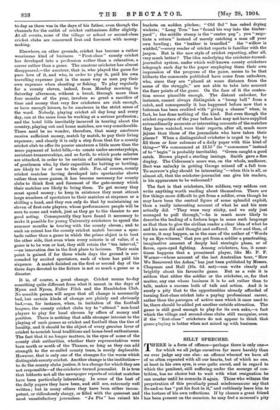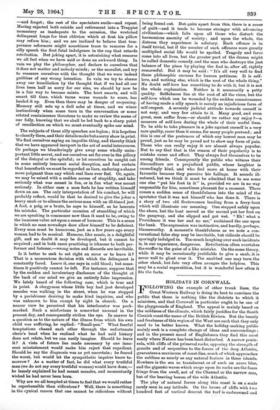SILLY SPEECHES.
THERE is a form of offence—perhaps there is only one-• for which we all judge ourselves far more harshly than we ever judge any one else: an offence whereof we have all of us often repented with all our hearts, but of which no one, at least in his own eyes, is ever quite cured, and in regard to which the penitent, still suffering under the scourge of con- trition, has no choice but to wait with what resignation he can muster until he commits it again. Those who witness the perpetration of this peculiarly penal misdemeanour say that So-and-so has "put his foot in it," and ruthlessly leave him to the torture of his own reflections. If by chance a great friend has been present on the occasion, he may feel a moment's pity
—and forget; the rest of the spectators smile—and repeat. Having rejected both suicide and retirement into a Trappist monastery as inadequate to the occasion, the wretched delinquent longs for that oblivion which at first his pillow may refuse him ; and we are inclined to believe that tem- perance reformers might sometimes trace to remorse for a silly speech the first fatal indulgence in the cup that retards retributien. But joking apart, it is astonishing what remorse we all feel when we have said or done an awkward thing. In vain we play the philosopher, and declare to ourselves that it does not matter and nobody minds ; or the moralist, and try to reassure ourselves with the thought that we were indeed guiltless of any wrong intention. In vain we try to shame away our humiliation by the thought that if we had all our lives been half as sorry for our sins, we should by now be in a fair way to become saints. The hurt smarts, and will smart till time, which turns worse wounds to scars, has healed it up. Even then there may be danger of reopening. Memory still sets up a dull ache at times, and we wince instinctively when some turn in the conversation or some related reminiscence threatens to make us review the scene of our folly, knowing that we shall be led back to a sharp point of recollection on which we must eventually spike our mind.
The subjects of these silly speeches are legion; it is hopeless to classify them, and their details make but a sorry show in print. We find ourselves saying an impolite thing, and thereby think that we have appeared inexpert in the art of social intercourse. Or perhaps we blunderingly give away some wholly unim- portant little secret, and see ourselves set for ever in the pillory of the disloyal or the spiteful; or let ourselves be caught out in some entirely innocent social deception, and feel certain that henceforth we must be regarded as liars, enduring a shame more poignant than any which real liars ever feel. Or, again, we may be seized with a sudden access of stupidity, and take seriously what was meant in fun, or in fun what was meant seriously. In either case a man feels he has written himself down an ass. The only interpretation of his conduct, he will probably reflect, would be that he desired to give the joker a heavy snub or to silence the serious man with an ill-timed jest. A fool, a prig, or a brute, he says to himself, as he laments his mistake. The particular occasion of stumbling of which we are speaking is commoner now than it used to be, owing to the immense value set upon a sense of humour. This is a sense in which no man nowadays dare allow himself to be deficient. Every man must be humorous, just as a few years ago every woman had to be musical. Humour, like music, is a delightful gift, and no doubt it may be developed, but it cannot be acquired ; and in both cases practising is irksome to both per- former and listener,—wrong notes and discords are inevitable.
Is it better to seek to set right an error or to leave it P That is a momentous decision with which the delinquent is constantly faced. Leave it, one says in cold blood; but some- times it positively cannot be left. For instance, suppose that by the sudden and involuntary disclosure of the thought at the back of our mind we give an entirely false impression. We lately heard of the following case, which is true and in point. A clergyman whose little boy had just developed measles was walking in the street, when he was stopped by a parishioner desiring to make kind inquiries, and who was unknown to him except by sight in church. On a nearer view he perceived that his interlocutor was pock- marked. Such a misfortune is somewhat unusual in the present day, and consequently strikes the eye. In answer to a question as to the nature of the illness from which his own child was suffering, he replied : "Small-pox." What fearful temptations chased each other through the unfortunate cleric's head when he realised what he had said history does not relate, but we can easily imagine. Should he leave it? A vista of future lies made necessary by one inno- cent misstatement would make him reject that expedient. Should he say the diagnosis was as yet uncertain ; he feared the worst, but would let the sympathetic inquirer know to- morrow ? As a matter of fact, he did what every truthful man (we do not say every truthful woman) would have done,— he lamely explained he had meant measles, and momentarily wished he had never been born.
Why are we all tempted at times to feel that we would rather be reprehensible than ridiculous P Well, there is something in the cynical reason that one cannot be ridiculous without being found out. But quite apart from this, there is a sense of guilt—and it tends to become stronger with advancing civilisation—which falls upon all those who disturb the harmonious amenity of society; and upon the whole, the distress they experience is salutary. Each offence is in itself trivial, but if the num her of such offences were greatly multiplied social life would be spoiled. Tragedy and farce come into all lives, but the greater part of the drama might be called domestic comedy, and the man who destroys the just balance of the piece by playing the fool is, after all, rightly remorseful. But it may be said : "It's all very well to find these philosophic excuses for human pettiness. It is self- love, and nothing else, which is the root of the whole thing." No doubt self-love has something to do with it, but it is not the whole explanation. Neither is it necessarily a petty quality. ' Selfishness lies at the root of all the vices, but the self-love which can be wounded by the sudden consciousness of having made a silly speech is merely an injudicious form of self-respect. A severely judicial attitude towards oneself is not easy, and very few attain to it. Many good, and even great, men suffer from—or should we rather say enjoy P—a measure of self-love during the whole of their useful lives. To be able to take pleasure in a joke against oneself is a very rare quality, rarer than it seems, for many people pretend ; and this is one of the pretences of which any honest man may be proud, just as he may be proud not to show any form of pain. Those who can really enjoy it are almost always popular. But to say that that is the reason of their popularity is to mistake cause and effect. They always feel themselves to be among friends. Consequently the public who witness their discomfiture are a prejudiced public, whose laughter is exceedingly kind, and who feel more at home with their favourite because they perceive his failings. It sounds ill- natured, but we think it must be admitted that to see some one else "put his foot in it" is, provided we are in no way responsible for him, sometimes pleasant for a moment. There comes a sudden sense of thankfulness into the mind of the spectator that it was not himself who has done it. There is a story of two old Scotswomen landing from a ferry-boat which will illustrate our meaning. One stepped safely upon the shore, but the boat moved as the second put her foot on the gangway, and she slipped and got wet. " Eh ! what a , Providence it was her and no me," exclaimed the one upon the bank. The expression was instinctive, and hardly, perhaps, blameworthy. A moment's thankfulness as we note a con- versational false step may be inevitable, but ridicule should be sparingly indulged in. Too much laughing over such incidents is, in our experience, dangerous. Retribution often overtakes the scoffer in the guise of a like mistake. On the same theory, while it may be occasionally justifiable to give a snub, it is never well to gloat over it. The snubbed one may turn the other cheek, but fate very often avenges the helpless. This may be a social superstition, but it is wonderful how often it fits the facts.







































 Previous page
Previous page